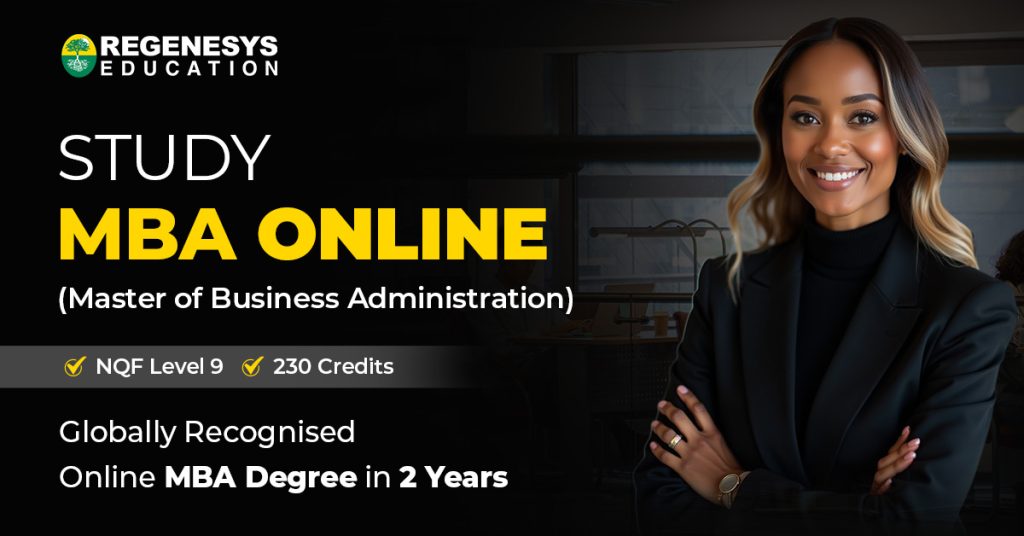Many professionals aspire to pursue an MBA without a degree to accelerate their careers, yet the standard pathway in South Africa usually requires an NQF Level 8 qualification. However, the South African higher education system offers alternative routes, particularly for experienced professionals. Recognition of Prior Learning (RPL) and other flexible pathways allow qualified individuals to gain entry into postgraduate MBA programmes even without a formal degree.
This article includes the standard MBA requirements, exceptions, universities offering flexibility, RPL options, risks and challenges, alternative pathways, and the Regenesys MBA pathway.
Table of Contents
- Standard MBA Entry Requirements in South Africa
- Exceptions for MBA Admission in South Africa
- Recognition of Prior Learning (RPL) for MBA
- Risks and Challenges of Studying an MBA Without a Degree
- Alternatives to an MBA Without a Degree
- Pathway Into MBA Through Regenesys
- Who Can Benefit from an MBA Without a Degree?
- Conclusion
- MBA Without a Degree in South Africa – FAQ
Standard MBA Entry Requirements in South Africa
Most top MBA schools in South Africa adhere to the SAQA framework for postgraduate studies. An MBA is an NQF Level 9 qualification, and typically requires applicants to hold an NQF Level 8 degree or equivalent.
The following are standard Regenesys MBA entry criteria:
1. Educational Qualification (NQF Level 8)
Applicants usually require a recognised bachelor’s honours degree, postgraduate diploma, or equivalent. This ensures a strong academic foundation for complex management modules.
2. Work Experience
Most schools expect 3–5 years in supervisory or managerial roles. Practical exposure helps students contribute to case studies and class discussions.
3. English Proficiency
Effective communication in English, both written and oral, is essential for completing assessments, reports, and presentations.
4. Additional Assessments
Basic computer skills, internet connection, relevant IT resources, entrance exams, interviews, or motivation letters may be required to assess a candidate’s readiness for rigorous MBA coursework.
These criteria reflect traditional MBA requirements, but South Africa allows for exceptions for experienced professionals.

Exceptions for MBA Admission in South Africa
While standard entry requires a degree, some universities offer flexibility for professionals with exceptional experience. Candidates without a formal degree may still be considered based on leadership achievements and industry expertise. Many institutions, including Regenesys, adopt an admissions process that reviews professional track records, certifications, and leadership roles. This approach not only widens access to MBA studies but also ensures classrooms are enriched with diverse perspectives and real-world problem-solving experiences.
The following are common exceptions:
1. Senior Professionals Without Degrees
Individuals with 10+ years in managerial or leadership roles may qualify through alternative assessment methods. Their extensive experience often compensates for the lack of a formal degree.
2. Entrepreneurs
Founders who have successfully managed businesses can demonstrate sufficient practical knowledge for MBA entry, showing leadership and strategic capabilities in real-world scenarios.
3. Professional Certifications
Recognised industry certifications such as ACCA, CFA, or CIMA can strengthen an application in the absence of a degree, proving competence in business and financial principles.
Reasons for these exceptions:
- Experienced professionals bring practical insights that enrich MBA classrooms.
- Higher education institutions aim to balance academic requirements with real-world applicability.
These exceptions ensure that talented professionals are not excluded from pursuing an MBA simply because they lack traditional qualifications. By valuing real-world expertise, South African institutions create a more inclusive and diverse learning environment.
Read the article, Best MBA Specialisations for Working Professionals
Recognition of Prior Learning (RPL) for MBA
Recognition of Prior Learning (RPL) is a key pathway that allows professionals to pursue an MBA without a degree by recognising their practical skills and work experience. This process ensures that professionals who have gained valuable expertise outside the classroom can still progress towards an MBA. In South Africa, RPL is widely used by MBA schools to open doors for talented individuals who can demonstrate competence and leadership potential.
Here’s how RPL for MBA works:
- Portfolio of Evidence: Applicants submit a detailed portfolio of work achievements, leadership experience, and professional development. This demonstrates competence equivalent to qualification.
- Assessment Process: Universities evaluate whether a candidate’s experience aligns with NQF Level 8 learning outcomes. A successful assessment confirms readiness for MBA studies.
- Bridging Modules: Some schools may require short courses to address specific academic gaps before full MBA enrolment, ensuring students have a strong foundation.
Benefits of RPL:
- Provides a pathway to obtain a prestigious MBA degree for professionals without formal academic qualifications.
- Recognises practical business and management skills that often surpass classroom learning.
- Opens inclusive opportunities for mid-career professionals, career switchers, and entrepreneurs.
RPL provides a powerful and practical pathway for professionals to access MBA programmes without a degree. By validating skills and experience, it bridges the gap between formal education and workplace achievement, enabling more leaders to step into advanced management studies.

Risks and Challenges of Studying an MBA Without a Degree
While pursuing an MBA without a degree is appealing, it presents specific challenges that candidates should consider. One of the main concerns is the level of academic intensity that MBA programmes are demanding, and those without a prior degree may initially struggle with advanced concepts in finance, economics, or strategic management. Another challenge is recognition: not all employers or international institutions may fully value an MBA earned without a traditional undergraduate background, which could affect career mobility abroad.
The key challenges include:
- Intensive Academic Rigour: MBA modules in finance, strategy, and economics require strong analytical skills. Candidates without a prior degree may face a steeper learning curve.
- Limited University Options: Only the top 10 MBA schools in South Africa accept non-degree candidates, narrowing opportunities.
- Global Recognition Issues: Some international employers prefer candidates with traditional academic qualifications.
- Bridging Requirements: Additional courses may be required, increasing the duration and cost of study.
Despite these challenges, many professionals complete their MBA studies using RPL and alternative pathways.
Also, read the article, Top Emerging Industries Offering MBA Graduate Jobs in SA
Alternatives to an MBA Without a Degree
If pursuing an MBA without a degree feels overwhelming or out of reach, you don’t have to pause your ambitions. Many professionals choose alternative qualifications that still deliver advanced business skills and provide a stepping stone towards an MBA in South Africa in the future. Regenesys Business School, one of the leading MBA schools in South Africa, offers excellent postgraduate diplomas designed for this purpose.
Here are some of the main alternatives offered by Regenesys:
Postgraduate Diploma in Business Management (PDBM)
The PDBM is designed for individuals who want to gain a strong foundation in management and leadership while preparing for more advanced studies. It covers critical areas like strategy, operations, and organisational behaviour, making it an excellent pathway into a full MBA programme.
Postgraduate Diploma in Digital Marketing (PDDM)
This programme focuses on equipping professionals with the digital marketing expertise needed in the online economy. It’s ideal for career switchers, entrepreneurs, or marketing professionals who want to formalise their knowledge and later pursue an MBA.
Postgraduate Diploma in Project Management (PDPM)
For professionals working in project-based industries, this diploma sharpens project leadership, planning, and execution skills. It is especially valuable for those seeking to transition into senior management roles or an MBA.
Entry Requirements for these Diplomas include:
- A 3-year Bachelor’s qualification or NQF Level 7 equivalent
- Relevant work experience
- Basic computer skills, internet access, and necessary IT resources
- Competence in English (both written and oral communication)
These programmes not only enhance employability and career growth but also act as formal stepping stones to an MBA degree.
By completing one of these postgraduate diplomas, you can meet the MBA eligibility criteria and seamlessly continue your journey towards a Master of Business Administration at Regenesys.
Pathway Into MBA Through Regenesys
Regenesys Business School provides a flexible and inclusive pathway for professionals seeking an MBA without a degree. The institution recognises that many successful managers, entrepreneurs, and specialists have built valuable expertise through work experience rather than traditional academic routes. Regenesys creates opportunities for diverse candidates to enter its prestigious MBA programme. This approach not only widens access but also ensures that learners bring rich, real-world insights into the classroom, making the MBA experience more practical, dynamic, and relevant.
Here’s why the Regenesys MBA stands out:
- Globally Recognised: Respected locally and internationally, giving graduates a competitive advantage.
- Transformative Learning Experience: Designed for leaders, managers, specialists, and entrepreneurs to enhance decision-making and strategic thinking.
- Flexible Study Modes: Available online or in contact mode, ideal for working professionals.
- Skill Development Focus: Enhances communication, leadership, and critical thinking capabilities.
Regenesys MBA Programme Overview:
- NQF Level: 9
- Duration: 2 years
- Credit Points: 230#
- SAQA ID: 97886
- Study Mode: Contact & Online
Through RPL and flexible entry, candidates gain world-class exposure and develop into effective leaders ready to succeed in Africa and beyond.
Who Can Benefit from an MBA Without a Degree?
An MBA without a degree is ideal for professionals who bring significant experience or leadership potential but lack formal academic qualifications. Many industries value practical expertise, decision-making ability, and leadership skills just as much as academic credentials. For such individuals, an MBA becomes a way to formalise their knowledge, gain advanced business insights, and open doors to executive-level opportunities. It also helps them build credibility in competitive markets, network with like-minded leaders, and stay relevant in an evolving business landscape.
Here’s how different groups can benefit:
- Non-Business Graduates: Professionals in law, medicine, engineering, or other fields can gain essential business knowledge. This helps them transition into management roles or enhance their career prospects.
- Career Switchers: Individuals moving from technical or specialised roles into management or entrepreneurship can acquire critical leadership and business skills to pivot careers successfully.
- Entrepreneurs: Business owners with years of practical experience but no formal qualifications can formalise their skills, learn strategic decision-making, and grow their ventures effectively.
- Senior Professionals: Managers with extensive experience can strengthen their strategic, analytical, and leadership capabilities, preparing them for executive roles.
This demonstrates how flexible MBA entry policies accommodate diverse career journeys, allowing professionals from varied backgrounds to achieve leadership success.

Conclusion
In 2025, pursuing an MBA without a degree in South Africa is possible through RPL, alternative pathways like Postgraduate programmes, or via institutions offering flexible admission policies. While challenges exist, these routes allow professionals to gain leadership skills, enhance career prospects, and obtain a globally recognised MBA degree.
The Regenesys MBA offers a practical and flexible programme that nurtures strategic thinkers, responsible leaders, and effective communicators. Whether you have a formal degree or, exploring accredited MBA schools in South Africa, it is the first step towards transforming your career and leadership potential.
MBA Without a Degree in South Africa – FAQ
Is it possible to do an MBA without a degree?
Yes, through RPL, programmes or by demonstrating significant work experience and industry achievements.
What is the NQF Level requirement for an MBA?
MBA is NQF Level 9, generally requiring NQF Level 8 or equivalent experience.
Can non-business graduates apply for an MBA?
Yes, often with supplementary work experience or bridging modules to meet MBA eligibility in South Africa.
What are the risks of pursuing an MBA without a degree?
Challenges include rigorous academic content, limited university options, and international recognition issues.
What alternatives exist if I don’t qualify?
Postgraduate Diploma in Digital Marketing (PDDM), and management development programmes are popular alternatives.
Which universities offer an MBA without a degree?
Institutions such as Regenesys, Milpark, UNISA, and Henley Business School Africa provide flexible pathways.







